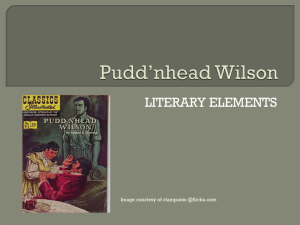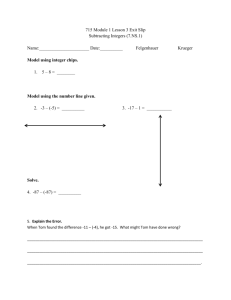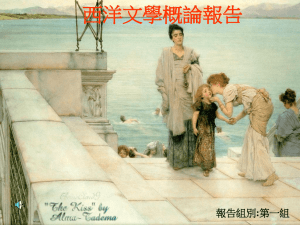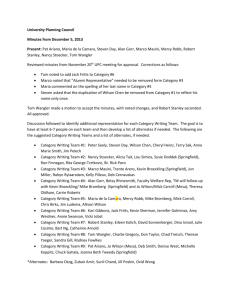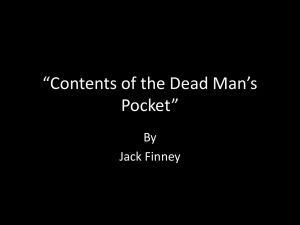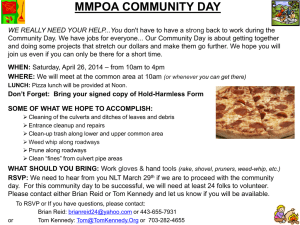File - Mrs. Nickell`s English III Weebly
advertisement
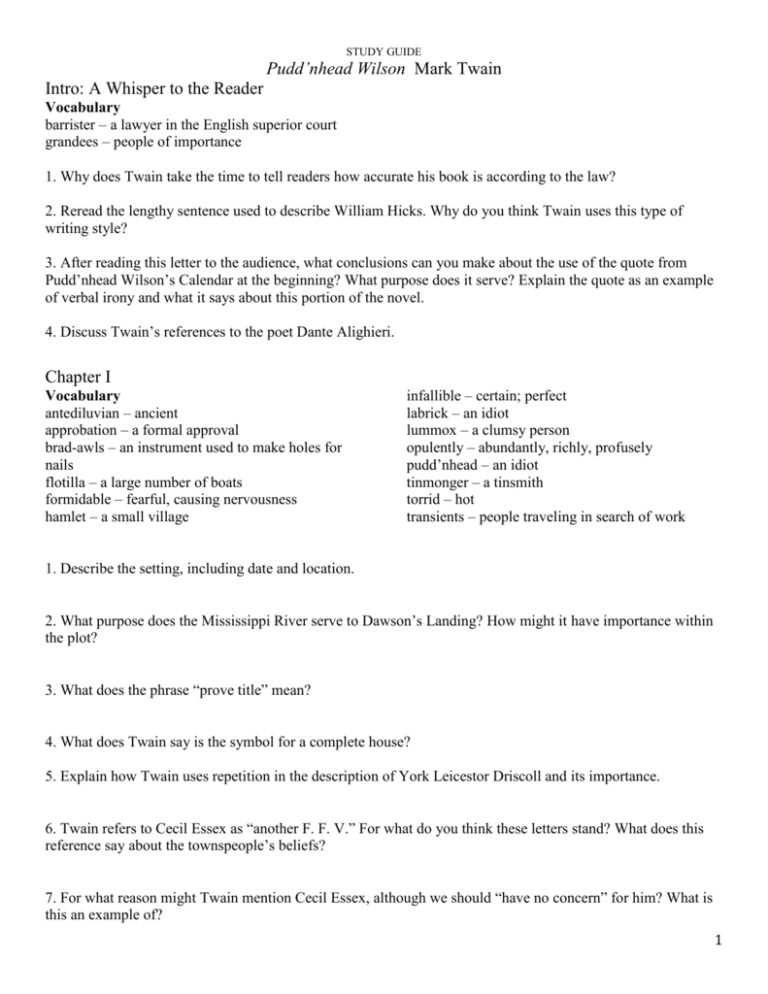
STUDY GUIDE Pudd’nhead Wilson Mark Twain Intro: A Whisper to the Reader Vocabulary barrister – a lawyer in the English superior court grandees – people of importance 1. Why does Twain take the time to tell readers how accurate his book is according to the law? 2. Reread the lengthy sentence used to describe William Hicks. Why do you think Twain uses this type of writing style? 3. After reading this letter to the audience, what conclusions can you make about the use of the quote from Pudd’nhead Wilson’s Calendar at the beginning? What purpose does it serve? Explain the quote as an example of verbal irony and what it says about this portion of the novel. 4. Discuss Twain’s references to the poet Dante Alighieri. Chapter I Vocabulary antediluvian – ancient approbation – a formal approval brad-awls – an instrument used to make holes for nails flotilla – a large number of boats formidable – fearful, causing nervousness hamlet – a small village infallible – certain; perfect labrick – an idiot lummox – a clumsy person opulently – abundantly, richly, profusely pudd’nhead – an idiot tinmonger – a tinsmith torrid – hot transients – people traveling in search of work 1. Describe the setting, including date and location. 2. What purpose does the Mississippi River serve to Dawson’s Landing? How might it have importance within the plot? 3. What does the phrase “prove title” mean? 4. What does Twain say is the symbol for a complete house? 5. Explain how Twain uses repetition in the description of York Leicestor Driscoll and its importance. 6. Twain refers to Cecil Essex as “another F. F. V.” For what do you think these letters stand? What does this reference say about the townspeople’s beliefs? 7. For what reason might Twain mention Cecil Essex, although we should “have no concern” for him? What is this an example of? 1 8. Why does Twain mention the slave girl Roxana and her duties for Percy Driscoll? What might this be an example of? 9. Describe the citizens of Dawson’s Landing. 10. Explain how Wilson gains the nickname “Pudd’nhead.” 11. What might the opening quote have to do with the chapter? 12. How does this chapter act as exposition within the plot structure? Chapter II fortnight – a time period of 14 days Vocabulary abide – to bear, put up with magnanimity – generosity caste – a division of society piety – faith, devoutness chary – cautious plunder – loot combatants – people ready to fight or argue precedent – an act that serves as an example comforter – a thief protestations – claims conveyancing – drawing deeds reprisals – acts of revenge emery-bag – an article used in sewing to polish rust salable – able to be sold from needles and push needles sally – a saying or quip through hard fabric supplicating – humbling; praying; begging etiquette – manners 1. Which of Wilson’s fads causes the townspeople to regard him as even more of a pudd’nhead? 2. What makes Roxy comparably different than most slaves? 3. What does Valet de Chambre’s name mean? 4. From which culture is the father of Roxy’s baby? How do you know? Based on the circumstances of this chapter, predict what Roxy will do about stopping another “close call” in the future. 5. According to the “humane Negro prowler,” who was being robbed and how? What larger picture does this represent? How does Driscoll finally make the guilty answer? 6. Why is sending slaves “down the river” such a horrible punishment? 7. At the end of the chapter Twain refers to Driscoll as a god. What literary technique does he employ? What does it say about Driscoll’s personal beliefs and how he will raise his son? 8. Briefly explain the events of rising action in this chapter. 2 Chapter III Vocabulary cloud – a shawl communing – discussing conflagration – an intense burst (of color in this instance) or flame (usually referring to a fire) crooning – singing, speaking house-minions – house servants, slaves lurid – pale pauper – a poor person peremptoriness – haughtiness speculations – business transactions, deals; risks usurper – a thief 1. What impact does the robbery have on Roxy? Why would killing Percy Driscoll not help Roxy’s son? 2A. Reread the description of Roxy’s actions in this chapter, and then define each of the following terms. Third person omniscient point-of-view often reveals the author’s feelings through use of specific words within the novel. conflagration linsey-woolsey death-toilet cloud 2B. Based on the meanings of these words, how does Twain feel about Roxy’s decision to prepare for death? 3. What “strange light dawned” in Roxy’s eyes? 4. How does Roxy justify her decision about switching the babies? 5. Who is the only person Roxy is afraid of? Why? 6. Many interpretations of the introductory quote are possible. What is a benefactor? Based on the definition, who might be a benefactor in the novel? Why? According to the quote, who in this chapter has “lived long enough to know what life is”? What is life, according to this character? Chapter IV Vocabulary adversaries – enemies appeasing – soothing, pacifying assailed – attacked canings – beatings with a cane caprices – whims capricious – unpredictable chambermaiding – working as a maid cleaning rooms and making beds changelings – children who were switched in infancy consummated – completed docile – gentle; obedient dupe – a gullible person; a pushover epithet – a title, nickname expostulated – thought; examined fortifications – forts, structures fractious – irritable impotent – powerless jeers – shouts, mocking, name-calling nursling – a nursing child obsequiousness – the act of being obedient; subservient ostensible – visible, appearing to be true provocation – irritation; motivation, a trigger proxy – a substitute unrebuked – without punishment usurpation – taken without right volley – a burst of many things at once 3 1. List the differences between “Tom” and “Chambers.” Do you think the children would have acted the same had Roxy not switched them at birth? 2. Why does Roxy not brutally punish “Chambers?” 3. Explain why Twain might use repetition of the word “holy” in describing the hand-medowns “Chambers” wears. 4. How does “Tom” treat “Chambers” as they mature? 5. Summarize the diving situation in this chapter. Explain the irony using your knowledge of the treatment of slaves at the end of the nineteenth century. 6. What “trick” did the boys play on each other when they were 15? Explain the circumstances of “Tom’s” “joke” and the dramatic irony of his verbal rebukes. 7. What happens to “Chambers” when he disobeys “Tom’s” orders to beat up the other boys? 8. How does “Tom” treat Roxy? 9. What major event happens at the end of the chapter? What are the effects of the event? Chapter V Vocabulary cipher – a worthless person incommode – an inconvenience indolent – lazy surliness – arrogance tippling – drinking liquor 1. Why was “Tom” a prize to Mrs. York Driscoll? 2. Where did “Tom” go after he turned 19, and how long was he there? Why did he come home? How has he changed? 3. What did the people of Dawson’s Landing mean by saying “Tom” “preferred to be supported by his uncle until his uncle’s shoes should become vacant”? 4. Why does “Tom” begin traveling to St. Louis? 5. Describe Wilson’s “whimsical almanac.” How do the people of Dawson’s Landing react after Judge Driscoll tries promoting it? 6. What good fortune comes to Aunt Patsy Cooper and her daughter Rowena? What seems peculiar about where the newcomers are from? 7. Reread the very last sentence of this chapter. How are the newcomers paralleled with “Tom” and “Chambers”? 4 Chapter VI Vocabulary ascending – increasing besieged – surrounded; bombarded inclination – a nod prodigies – highly talented children prodigious – exciting; unusual, monstrous sharks – people who prey on others through trickery sharpers – swindlers, cheats 1. Summarize the twins upbringing. 2. How do the twins answer Rowena’s wish for a grand climax to her glorious day? 3. According to the second quote at the beginning of the chapter, what “habit” has been slowly brought into Dawson’s Landing? How? Chapter VII Vocabulary funning – joking levee – a reception; assembly militia company – a group of people organized for military purposes muskets – firearms nub – the gist, point solidified – secured; fixed vivacity – spirit, liveliness yarns – tales 1. How does Twain personify society in this Chapter? 2. Why did the twins not pay more respect to Judge Driscoll for showing them around Dawson’s Landing? 3. What might the opening quote imply about the mysterious woman Wilson sees in “Tom’s” bedroom window? 4. What is a nymph? Who is the nymph in this chapter? Chapter VIII Vocabulary asperity – harshness; severity berth – a job; a safe distance blenched – whitened bluster – threatening speech; violent commotion grenadier – a soldier armed with grenade implacability – not being pleased incongruous – unsuitable marvel – a wonder packet – a passenger boat pallid – pale petition – a request prime – of high quality rabid – extreme servilities – submissive behavior wonted – ordinary, usual 5 1. Explain what mistake Roxy made in putting “shoes on one bar’footed nigger to trample on her with.” 2. What happens to all of the money Roxy saved while she was working as a chambermaid? 3. According to “Chambers,” what happens after Judge Driscoll finds out about “Tom’s” gambling problems? 4. What does “Tom” think Roxy knows? 5. Why does Roxy refuse to tell “Tom” everything she knows? Chapter IX Vocabulary blatherskite – a person who talks foolishly complacency – self-satisfaction degradation – a decline to a lower level pomp – splendor sycophancy – flattery 1. After “Tom” says he cannot get any lower than he is now, the narrator comments, “But that was a hasty conclusion.” What literary term is this an example of? Explain your answer. 2. What are the Fates in Greek mythology? Explain the statement, “She rose, and gloomed above him like a Fate.” 3. How does “Tom” react to the news Roxy gives him? 4. How does Roxy get her money? 5. Who is “Tom’s” real father? Why is Roxy so proud of it? Chapter X Vocabulary abashed – embarrassed chattel – a person’s property; a slave intrepidity – incurable reconnoiter – a survey tattle – gossip; chatter 1. What questions does “Tom” begin asking himself? How do you think he would have answered them before he discovered his true identity? 2. What is Krakatoa? How does the use of this event describe “Tom” at this point in the novel? 3. Explain “Tom’s” state of mind in this chapter. 4. With what term does “Tom” refer to himself? Why does Twain use quotation marks? Discuss the use of this term by whites versus blacks. How is it the same/different? 5. The events in this chapter are considered a flashback. Explain why the departure from the chronology of events is effective. 6 Chapter XI Vocabulary acclamation – a vote, approval succumbing – yielding blind – a distraction surreptitious – secretive; sneaky chaff – banter; idle talk, jovial talk teetotaler – a person who does not drink alcohol perdition – hell undulatory – waviness of motion proclivities – inclinations; predispositions witticism – cleverly funny raillery – to jest, banter 1. What are the two definitions of “smooth” the twins use when referring to Tom? Notice which twin makes each definition. 2. What is the “Awful Mystery” “Tom” discusses? 3. What mistake does “Tom” unknowingly make at Wilson’s? 4. What false belief does the characters of the novel hold of twins? 5. What does Twain mean when he says of the twins, “They rightly judged, now…”? 6. What does Wilson reveal about Luigi while reading his palms? Explain Luigi’s story. How does he feel about the incident? 7. What does “Tom’s” internal dialogue reveal? 8. What happens when Wilson tries to read “Tom’s” hand? 9. What comment does “Tom” make about Angelo? What does it cause? Chapter XII Vocabulary cartel – a written agreement fervently – passionately incredulity – disbelief skiff – a small boat unsmirched – untouched, unblemished 1. According to Judge Driscoll, what is the most important thing? 2. What news is brought to Driscoll as he and Pembroke Howard row their boat ashore? 3. Once Driscoll confirms the news with “Tom,” what does he want “Tom” to do? What is “Tom’s” response? How does Driscoll handle it? 4. How does “Tom” believe he will win back his uncle’s favor? 5. Explain how “Tom” is like the “flea” in the chapter’s introductory quote, using evidence from the novel thus far. 7 Chapter XIII Vocabulary calaboose – a jail degenerate – degraded desolate – joyless dissipated – corrupted draymen – a person who works by hauling goods in a cart or wagon paltry – trivial; meager remnant – the remains 1. Much to “Tom’s” chagrin, he discovers Wilson would have done what for him? 2. What is the reward for the thief and the twins’ dagger? 3. What is “Tom’s” reaction to the reward? How is his reaction an example of dramatic irony? 4. Why has Justice Robinson, Buckstone, and Jim Blake come to Wilson’s house? Chapter XIV Vocabulary disconsolate – cheerless, dejected ejaculations – short utterances, exclamations levity – steadiness revulsion – a withdraw sordid – wretched vouchsafed – granted 1. What does Pembroke Howard mean by saying, “I’ll have him in the vacant stretch between Wilson’s and the haunted house within the hour, and I’ll bring my own pistols.” To whom is “him” referring? 2. What does the judge do before the duel in regards to “Tom?” How does he justify this action? How does “Tom” find out about it, and what is his response? 3. Do you think “Tom” means what he says about the “new” him? Explain your answer. 4. What does the following metaphor mean? “It’s a bag of gold that has turned to dirt and ashes in my hands.” 5. What news does Roxy tell “Tom”? What is his reaction? 6. When “Tom” recounts how the duel was supposed to include him, how does Roxy respond? 7. How does Twain describe Roxy’s laughter in this chapter? 8. What has happened to Roxy? 9. From what lineage does Roxy claim they are? 10. Explain Roxy’s plan for “Tom.” 8 Chapter XV Vocabulary bail – to agree bauble – a trinket suppositions – hypothetical transient – fleeting 1. How do the people of Dawson’s Landing judge their citizens? 2. Explain how Wilson planned to catch the robber. 3. Why, according to “Tom,” did Wilson’s plan not work out? 4. How does “Tom” get back into the judge’s good graces? 5. What happens to “Tom” as he travels to St. Louis? 6. Predict what will happen in the next chapter. Chapter XVI Vocabulary abaft – to the rear miscreant – a criminal steerage-bunk – inferior lodgings for lower-class citizens torpor – indifference, apathy 1. What is Roxy’s plan to get “Tom” out of debt? 2. Why is she being referred to by her full name of Roxana? 3. What part of Roxy’s plan does “Tom” not follow? When does she realize it? Chapter XVII Vocabulary buncombe – nonsense canvass – solicitation of votes derision – hatred, contempt mountebanks – pretenders 1. Explain the twins’ popularity at the beginning of the chapter. Chapter XVIII Vocabulary irremediable – incurable lamentingly – regretfully, mournfully palliation – making excuses skinflint – a person who is stingy with his or her money; a cheapskate 1. Who does “Tom” find in his lodgings in St. Louis? What is wanted of him? 2. How does “Tom” feel about this person? 9 Chapter XIX Vocabulary accessions – approaching people atrophied – deteriorated confederate – an accomplice fetid – stinky humbugging – faking incensed – angered menagerie – a mixture night-taper – a candle profligate – lavish prostrated – helpless; exhausted vestige – a trace 1. How does Wilson justify the judge’s refusal to believe Luigi’s side of the story over “Tom’s”? 2. Why does Twain decide to explain “Tom’s” inner thoughts during the robbery? 3. What does “Tom” use to disguise himself physically? Why is that ironic? 4. What was “Tom” prepared to do if he were caught in the act? 5. Summarize the events of “Tom’s” robbery. 6. Who is initially blamed for the murder? What is expected to happen to him? 7. What happens to “Tom” after he officially returns to Dawson’s Landing? 8. What pleases Wilson about the crime scene? 9. What is the twins’ only defense with which Wilson can concur? 10. What does Wilson discover after examining the knife? 11. What effect does the repetition of “thinking” and “guessing” have? 12. How does “Tom” feel about the murder? Chapter XX Vocabulary accessory – a person indirectly involved in a crime basest – lowest commiseration – offering condolences countenance – a calm expression; a facial expression enigma – a mystery gibe – taunting words gravel – to irritate solemnities – somberness, gloominess 1. After the first day of trial for Judge Driscoll’s murder, what happens between “Tom” and Wilson at Wilson’s home? 2. Identify “it” in the following quote: “And for twenty-three years no man has ever suspected it!” 10 Chapter XXI Vocabulary adversary – an enemy corrugations – ridges, lines facsimiles – copies funereal – gloomy hazarded – risked natal – related to birth vanity – trifle 1. What is Wilson doing at the beginning of the chapter? 2. As Wilson begins in court, what is the audience’s response when although his witnesses are delayed, he says their testimonies will not be necessary? 3. As Wilson begins his statements, what facts does he list? 4. According to Wilson, what is the one way twins are never alike? 5. Who is the true murderer? How does this character confess? 11

